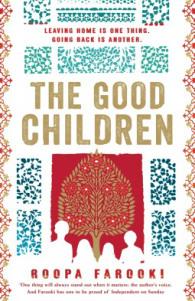
What’s it all about?:
Leaving home is one thing. Surviving is another.
1940s Lahore, the Punjab. Two brothers and their two younger sisters are brought up to be ‘good children’, who do what they’re told. Beaten and browbeaten by their manipulative mother, to study, honor and obey. Sully, damaged and brilliant, Jakie, irreverent and passionate. Cynical Mae and soft-hearted Lana, outshone and too easily dismissed.
The boys escape their repressive home to study medicine abroad, abandoning their sisters to their mother and marriages. Sully falls in love with an unsuitable Indian girl in the States; Jakie with an unsuitable white man in London. Their sisters in Pakistan refuse to remain trophy wives, and disgrace the family while they strike out to build their own lives.
As they raise their own families, and return to bury the dead, Sully and Jakie, Mae and Lana, face the consequences of their decisions, and learn that leaving home doesn’t mean it will ever leave them.
THE GOOD CHILDREN is a compelling story of discipline and disobedience, punishment and the pursuit of passion, following the children of a game-changing generation and the ties that bind them across cultures, continents and decades. Painful and sweet, tough and surprising, it is a landmark epic of the South Asian immigrant experience.
What did I think?:
First of all, a big thank you to Book Bridgr and Tinder Press for allowing me to read a copy of this fantastic novel. The author, Roopa Farooki has been long-listed twice for the Orange Prize (now Bailey’s Women’s Prize for Fiction) for her novels, Bitter Sweets and The Flying Man and after reading this beautifully written tale of how a mother’s love affects her children in different ways, I can definitely see why. It tells the story of four siblings – two boys, Sully and Jakie and two girls, Mae and Lana who grow up in 1940’s Lahore, Pakistan during the time of the partition under an authoritarian and controlling mother whose behavior to her children is a mixture of emotional, mental and physical abuse as she tries to bring them up as “good” children.
Sully and Jakie are sent overseas to America and London respectively to become doctors and are each very successful in their field but the looming shadow of their past and their mother’s influence haunts both and ends up influencing their life decisions. Sully ends up marrying a very “unsuitable” Indian girl and Jakie falls in love with an Irish man in a time when homosexuality was still very much frowned upon. The fact that he is a Pakistani doctor in the NHS in the 1950’s also makes his life very difficult, as racial prejudice was rife and he faces challenges every day both in his career and his love-life which also proves to be a rocky road. Mae and Lana, the girls left behind are expected to make good marriages because of the status of their own family and the disappointment of their mother in her sons who appear to have failed her. Both girls succeed in marrying well initially but have their own problems and indeed tragedies within the marriages. The siblings return home twice – for their fathers then their mothers funeral where it becomes obvious how much power their past has over them and how it has affected their whole lives as a result.
The novel is split up into different sections allowing the reader to “hear” from each character individually and covers the time period 1938-2009. I loved hearing from each character although I don’t feel we got to hear as much from the second daughter, Lana which was a shame. However, what I did hear was wonderful. As the oldest son, Sully probably struggles the most with his mother’s influence which seems to affect his whole personality and as a result, sadly, his marriage. Jakie, as I mentioned before has enough to deal with as regards racial and homophobic prejudice but his relationship with Frank, a challenging yet loveable character is also threatened. I really enjoyed reading about Mae who I felt was the strongest and most independent sibling of them all. I gave a little cheer every time she was able to stand up to her mother or when she decided to forge her own path in life, going against everything her culture (and mother) dictated. One of the many beautiful things about this novel has to be the powerfulness of the characters. In fact, once I finished, I felt like I knew them intimately and felt connected to their struggles. I think the author also tackles a range of difficult subjects, like family values, culture, homosexuality, racism (to name a few), with ease and finesse which left me with a lot to think about long after I had finished. I will definitely be reading more from Roopa Farooki and I hope this book gets the acclaim it deserves.
Would I recommend it?:
But of course!
Star rating (out of 5):


